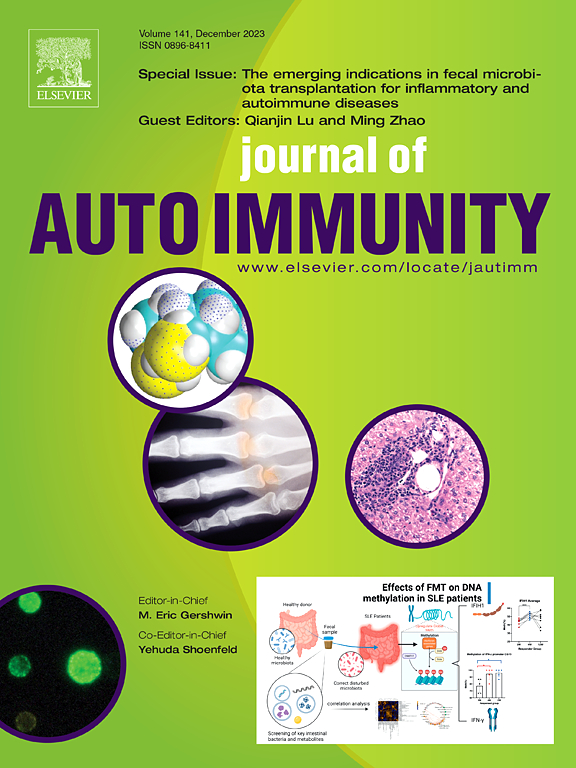翻译后修饰的蛋白质结合并激活补体,影响细胞摄取和自身抗体的形成
IF 7
1区 医学
Q1 IMMUNOLOGY
引用次数: 0
摘要
自身免疫性疾病,如类风湿关节炎(RA),以自身抗体的存在为特征,包括那些靶向经翻译后修饰(PTMs)修饰的自身蛋白的抗体。补体系统以其在先天免疫防御中的作用而闻名,但也在清除碎片和诱导抗体反应中发挥作用。因此,我们假设补体可以直接与ptm结合并靶向ptm修饰蛋白清除,或刺激(慢性)炎症和抗ptm自身免疫的发展。方法研究了6种ptm:硝化(Nt)、瓜氨酸化(Cit)、氨甲酰化(Ca)、乙酰化(Ac)、丙二醛-乙醛加合物(MAA)和晚期糖基化终产物(AGE)。我们使用质谱法和板结合法分析血清蛋白与ptm修饰蛋白的结合。在吞噬实验中研究了补体活化对细胞摄取的影响。分析587例RA患者补体snp与抗ptm自身抗体存在的关系。结果质谱分析显示,补体与Ca、Ac、MAA和AGE修饰的蛋白结合较强,但与Nt和Cit结合不强,这些观察结果通过板结合实验证实,Ca、MAA和AGE修饰的蛋白激活了经典途径,而不涉及抗体。Ac通过ficolin-3激活凝集素途径。补体活化对Ca-, Ac-, MAA-和age偶联珠增强吞噬。补体基因中的snp与较高的补体活性相关,与RA患者中抗ptm抗体的存在密切相关。结论含有ptm的Ca、Ac、MAA或AGE蛋白可激活补体。这些补体调理的ptm增加了吞噬作用,并可能导致抗ptm抗体的产生。本文章由计算机程序翻译,如有差异,请以英文原文为准。

Post-translationally modified proteins bind and activate complement with implications for cellular uptake and autoantibody formation
Introduction
Autoimmune diseases, such as rheumatoid arthritis (RA), are characterized by the presence of autoantibodies including those targeting self-proteins modified by post-translational modifications (PTMs). The complement system is known for its role in innate immune defense, but also in clearing debris and induction of antibody responses. We therefore hypothesized that complement could directly bind to PTMs and target PTM-modified proteins for clearance, or stimulate (chronic) inflammation and development of anti-PTM autoimmunity.
Methods
Six PTMs were investigated: nitration (Nt), citrullination (Cit), carbamylation (Ca), acetylation (Ac), malondialdehyde-acetaldehyde adducts (MAA) and advanced glycation end-products (AGE). We used mass spectrometry and plate-bound assays to analyze binding of serum proteins to PTM-modified proteins. The impact of complement activation on cellular uptake was studied in phagocytosis assays. The relationship between complement SNPs, and presence of anti-PTM autoantibodies was analyzed in 587 RA patients.
Results
Mass spectrometry analysis revealed a strong binding of complement to proteins modified with Ca, Ac, MAA and AGE but not to Nt and Cit. These observations were confirmed by plate-bound assays revealing that Ca-, MAA- and AGE-modified proteins activated the classical pathway, without involving antibodies. Ac activated the lectin pathway through ficolin-3. Complement activation on Ca-, Ac-, MAA- and AGE-coupled beads enhanced phagocytosis. SNPs in complement genes, associated with higher complement activity, were strongly associated with the presence of anti-PTM antibodies in RA patients.
Conclusion
Proteins containing the PTMs Ca, Ac, MAA or AGE activate complement. These complement opsonized PTMs increase phagocytosis and may lead to the development of anti-PTM antibodies.
求助全文
通过发布文献求助,成功后即可免费获取论文全文。
去求助
来源期刊

Journal of autoimmunity
医学-免疫学
CiteScore
27.90
自引率
1.60%
发文量
117
审稿时长
17 days
期刊介绍:
The Journal of Autoimmunity serves as the primary publication for research on various facets of autoimmunity. These include topics such as the mechanism of self-recognition, regulation of autoimmune responses, experimental autoimmune diseases, diagnostic tests for autoantibodies, as well as the epidemiology, pathophysiology, and treatment of autoimmune diseases. While the journal covers a wide range of subjects, it emphasizes papers exploring the genetic, molecular biology, and cellular aspects of the field.
The Journal of Translational Autoimmunity, on the other hand, is a subsidiary journal of the Journal of Autoimmunity. It focuses specifically on translating scientific discoveries in autoimmunity into clinical applications and practical solutions. By highlighting research that bridges the gap between basic science and clinical practice, the Journal of Translational Autoimmunity aims to advance the understanding and treatment of autoimmune diseases.
 求助内容:
求助内容: 应助结果提醒方式:
应助结果提醒方式:


